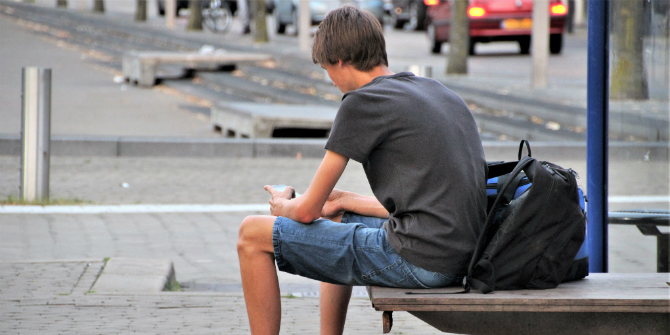 Yesterday, the House of Lords debated the new Data Protection Bill which will update regulations about data processing. Focussing on children’s rights to privacy, Claire Bessant outlines the legal remedies a child who objects to parental sharenting might consider using to remove sharented information. She discusses confidence, Misuse of Private Information and Data Protection to show the complexity of protecting a child’s right to privacy online. Claire is an Associate Professor at Northumbria University’s Law School, Newcastle upon Tyne. [Header image credit: J. Stewart, CC BY-NC 2.0]
Yesterday, the House of Lords debated the new Data Protection Bill which will update regulations about data processing. Focussing on children’s rights to privacy, Claire Bessant outlines the legal remedies a child who objects to parental sharenting might consider using to remove sharented information. She discusses confidence, Misuse of Private Information and Data Protection to show the complexity of protecting a child’s right to privacy online. Claire is an Associate Professor at Northumbria University’s Law School, Newcastle upon Tyne. [Header image credit: J. Stewart, CC BY-NC 2.0]
In September 2016 the media reported that an 18-year-old Austrian girl was suing her parents for breach of privacy because they had posted embarrassing childhood photographs on Facebook. The father allegedly refused to remove his daughter’s images because he believed he had the right to use the images as he wished. While this story was untrue, it raises two questions: could a child actually sue their parents? And should the state intervene in such a dispute?
The average parent shares almost 1,500 images of their child online before their fifth birthday, and more than 80% of children have an online presence by the age of two. This implies that sharenting is the norm, that children should expect to have their information sharented. While suggests that, in fact, many people never sharent, and this is borne out by my own research,[1] increasingly we hear of concerns about parental ‘oversharenting’ – parents sharing too much or inappropriate information, even when they know this might embarrass or upset their child. While it seems unlikely that a child would sue their parents, might it actually be a possibility?
My article on sharenting outlines three primary remedies a child who objects to parental (over)sharenting might consider (as well as asking parents or social network providers to remove the information)
I. Confidence
A child may obtain an injunction to prevent disclosure of confidential information, although this would not protect information of a relatively trivial nature, such as photographs taken in public or information which is/has become public knowledge.
II. Misuse of Private Information (MOPI)
Alternatively a child may obtain an injunction under the MOPI tort, if they can establish that:
- they had a reasonable expectation of privacy in the sharented information; and
- when their right to privacy is balanced against their parents’ rights, their rights require protecting.
The biggest unknown is how the courts will respond to the essential question: ‘Would a reasonable person of ordinary sensibilities placed in the same position as the child and faced with the same publicity consider the child had a reasonable expectation of privacy in the sharented information?’ Any child who brings a sharenting claim will be asking the courts to comment on social norms, to express a view on sharenting. How the courts might respond is unclear.
Even if the courts did decide that children should expect their privacy to be respected, the MOPI claim is not guaranteed success. The courts must still balance the child’s Article 8 right to respect for private life with their parents’ rights. Sharenting places the parents’ Article 8 right and Article 10 right to freedom of expression in direct conflict with their children’s Article 8 right. And sharenting may also cause other harms, as we are constantly reminded by newspapers discussing the pros and cons and dangers of sharenting.
In the Weller case, Lord Dyson suggests that while ‘a child’s right is not a trump card’, the child’s best interests come first, and ‘where a child’s interests would be adversely affected, they must be given considerable weight.’ In Re J, where a father disclosed information about court proceedings relating to his son, Justice Munby suggested ‘Article 10 cannot be allowed to justify conduct which interferes with a child’s Article 8 rights to an extent that is harmful to him.’ These cases indicate that courts might be supportive of some children’s sharenting claims.
Parents are often considered the ‘gatekeepers’ of their children’s information. Indeed, in a number of court cases involving celebrities’ children, the English judiciary seem to suggest that parents are the best people to decide when and whether a child’s information is shared (Weller v Associated Newspapers, AAA v Associated Newspapers, Murray v Big Pictures (UK) Ltd). Where the sharented information celebrates a child’s achievements, parents might argue that no harm is caused to the child, and the parental right to freedom of expression should prevail. Parents might also argue that their right to respect for family life affords them a right to determine how their child’s information is shared, that it is not a matter for the state (unless the child suffers significant harm). Until a case comes before the courts we cannot tell whether the courts would accept either argument.
III. Data protection
Steinberg has suggested a child might use ‘the right to be forgotten’ to remove sharented information, and in some European countries this might succeed. However, in England, while a child could theoretically use the English equivalent (the right to prevent processing likely to cause damage or distress), the Information Commissioner’s Office has stated it will not consider complaints against individuals who have posted personal data online in a personal capacity. Currently, children will struggle to use the Data Protection Act 1998 to remove sharented information.
The new General Data Protection Regulation, however, places much greater emphasis on children’s rights. Perhaps more importantly, in the Queen’s Speech, the government promised that it would use a new Data Protection Act ‘to give people new rights to “require major social media platforms to delete information held about them at the age of 18.”‘ While these provisions are not specifically directed at resolving sharenting disputes, they potentially offer children a new, practical remedy.
Conclusions
While a child could potentially bring a legal action to secure the removal of sharented information, none of the current legal remedies offers guaranteed success. The government’s proposals to afford 18-year-olds rights to require social media platforms to delete information held about them may provide a solution for some young people who object to parental sharenting, although this might be seen as too little, too late. Why should 13-year-olds, for example, deemed capable by the law of using social media and thus determining how their information is used, be unable to request deletion of sharented information?
With the Data Protection Bill having recently been published, now is the opportune time for academics and policy-makers to consider more fully how the law should respond to parental sharenting. In the meantime, while the recent Ofcom statistics suggest sharenting may not be as prevalent as earlier reports had suggested, more than 4 in 10 parents do regularly share photos of their children online. If children’s privacy rights are to be effectively protected, the state should be providing greater information to parents about the consequences of sharenting, as suggested by Steinberg, and by the Facebook posts made by the police in both France and Germany.
Notes
[1] Between November 2016 and July 2017 I interviewed 45 parents. Strikingly, only 12 (27%) admitted to sharing their children’s images online (via Facebook, Instagram or a personal website), while a third (15 parents) chose to share family photographs via WhatsApp rather than via public forums such as Facebook or Instagram. All but one who did sharent said they would remove their children’s information if asked.
This post gives the views of the authors and does not represent the position of the LSE Parenting for a Digital Future blog, nor of the London School of Economics and Political Science.





